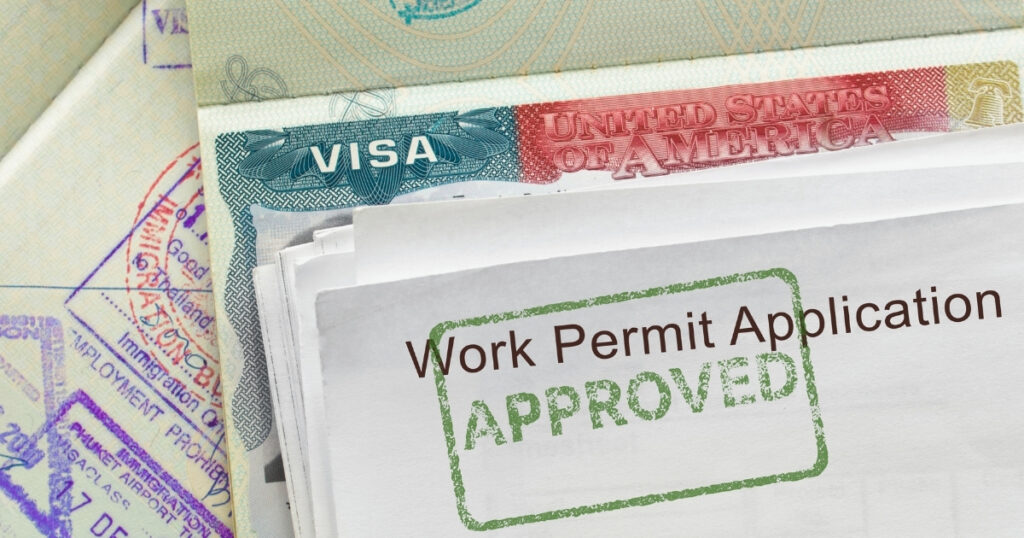Germany’s structured immigration system offers several work visa pathways for digital nomads seeking to base themselves in this central European hub. With specific options for freelancers, self-employed professionals, and remote workers, understanding which work visa for Germany matches your circumstances is essential for a successful application.
The German work visa landscape underwent significant reforms in 2023, creating more opportunities for location-independent professionals while still maintaining strict documentation requirements. These changes have made obtaining a work visa for Germany more accessible for digital nomads, though navigating the application process remains a detailed undertaking.
In this comprehensive guide, we’ll examine each work visa option for Germany available to digital nomads, breaking down eligibility requirements, application procedures, and ongoing compliance obligations. Nomada has researched the latest regulations to provide you with accurate, actionable information that simplifies your journey to working legally in Germany.
Understanding the German work visa system

Before diving into specific visa types, it’s essential to understand the fundamental structure of Germany’s work authorization framework. The work visa for Germany system distinguishes between residence permits that allow work and those that don’t, with specific categories designed for different professional situations.
The German residence permit framework
Germany operates under a two-tiered immigration system. First, you’ll need a national visa (D-visa) to enter Germany with the intention to work. Then, after arrival, you’ll convert this into a residence permit (Aufenthaltstitel) that specifies your work authorization terms.
For non-EU/EEA citizens, having the appropriate work visa for Germany with associated work privileges is mandatory before commencing any professional activities in Germany. The permit appears as a plastic card similar to an ID card and includes information about the specific work authorizations granted to the holder.
Digital nomads should note that tourist visas (Schengen visas) explicitly prohibit any form of work while in Germany, even remote work for foreign employers. Working while on a tourist visa can result in immediate deportation and future entry bans, making a proper work visa for Germany essential.
🌟 Pro tip: schedule your visa appointment at the German embassy or consulate in your home country at least 2-3 months before your planned move. Processing times vary significantly between countries, and securing an appointment itself can take several weeks in busy locations.
Key work visa categories relevant to digital nomads
Germany offers several visa categories that can accommodate digital nomads and remote workers, depending on their specific situation:
- The Freelancer Visa (Freiberufler): designed for independent professionals in specific liberal professions.
- Self-Employment Visa (Selbständiger): for those establishing businesses or startups in Germany.
- Employment Visa: for traditional employment contracts with German companies.
- EU Blue Card: for highly-qualified professionals with university degrees and high-income job offers.
- The New German Opportunity Card: a points-based system for skilled professionals.
The most relevant options for digital nomads are typically the Freelancer and Self-Employment visas, which provide the flexibility required for location-independent work while meeting Germany’s requirements for legal residence.
💡 Did you know? Germany introduced a specific digital nomad visa pathway in 2023, allowing remote workers employed by non-German companies to live in Germany for up to three years, provided they meet minimum income requirements and have comprehensive health insurance.
The Freelancer Visa: primary option for digital nomads

The Freelancer Visa (Freiberufler) represents the most appropriate work visa for Germany pathway for many digital nomads seeking to base themselves in Germany while working remotely for clients worldwide.
Qualifying professions and activities
When applying for a work visa for Germany as a freelancer, you should know that Germany distinguishes between “freelance professions” (freiberufliche Tätigkeiten) and “commercial activities” (gewerbliche Tätigkeiten). The freelancer visa is exclusively available to those working in recognized liberal professions, which include:
- Writers, journalists, and content creators
- Consultants and advisors
- Designers and artists
- IT specialists and programmers
- Engineers and architects
- Medical professionals
- Teachers and educators
- Translators and interpreters
- Tax and business consultants
Digital nomads whose professions fall into these categories can apply for the freelancer visa. Those working in other fields may need to consider the self-employment visa instead, which has different requirements and processes.
Application requirements and documentation
Securing a work visa for Germany under the freelancer category requires thorough preparation and comprehensive documentation. The following items are essential for a successful application:
- Valid passport with at least one year of validity remaining
- Completed visa application form
- Biometric photos meeting German specifications
- Comprehensive business plan in German
- Projected financial forecast and revenue expectation
- Proof of professional qualifications and experience
- Portfolio of previous work and client references
- Letters of intent from potential German clients
- Proof of adequate health insurance coverage
- Evidence of sufficient funds to support yourself
- Proof of adequate pension provision plans for applicants over 45
- Registration of local address (Anmeldung)
- Rental agreement for living accommodation
🌟 Pro tip: having at least two letters of intent from German clients significantly strengthens your freelancer visa application. These don’t need to be formal contracts but should indicate genuine interest in your services from businesses based in Germany.
Financial requirements and considerations
Applying for a work visa for Germany requires proving financial stability before authorities will grant work authorization. Although there’s no official minimum bank balance requirement, most successful applicants demonstrate savings of at least €10,000, with some authorities recommending higher amounts based on anticipated living expenses.
Additionally, health insurance is mandatory and must meet specific German standards when applying for a work visa for Germany. International travel insurance typically doesn’t satisfy these requirements. Proper German health insurance can cost between €300-800 monthly, depending on your age and coverage level.
For digital nomads over 45, the financial requirements include an additional pension provision component, where you must demonstrate adequate retirement planning through investments, private pension schemes, or property assets.
The self-employment visa alternative

For digital nomads whose activities don’t qualify for the freelancer work visa for Germany or who intend to establish more structured business operations in Germany, the self-employment visa offers an alternative pathway.
Key differences from the Freelancer visa
While similar in some aspects, this type of work visa for Germany applies to commercial activities rather than liberal professions. Key distinctions include:
- Requires registration of a formal business entity (Gewerbe)
- Subject to trade tax in addition to income tax
- Requires more substantial investment in the German economy
- Evaluated based on economic interest and local impact
- Usually demands more extensive business planning documentation
Digital nomads establishing agencies, e-commerce operations, or product-based businesses typically need this visa rather than the freelancer option. The authorities will assess whether your business concept addresses a specific economic need or creates jobs in Germany.
Enhanced documentation requirements
The self-employment visa application includes additional documentation beyond what’s required for the freelancer pathway:
- Comprehensive business plan showing market analysis
- Detailed financial projections for at least three years
- Business concept showing relevance to the German market
- Evidence of capitalization and investment funds
- Proof of job creation potential (if applicable)
- Local commercial registration (Gewerbeanmeldung)
- Chamber of Commerce registration documentation
The review process is typically more rigorous, with applications sometimes assessed by local chambers of commerce and economic development offices to evaluate the potential business contribution to the region.
Practical connectivity considerations for working in Germany

Maintaining reliable international connectivity is essential for digital nomads with a work visa for Germany. While the country offers excellent infrastructure, there are practical considerations for ensuring seamless remote work capabilities.
Digital infrastructure and connectivity solutions
Germany provides robust internet infrastructure in major cities, though rural areas may have more limited coverage. Fiber connections are becoming increasingly available in urban centers, while 4G/5G coverage is widespread across the country.
For digital nomads requiring constant connectivity, having redundant internet solutions is crucial. Coworking spaces in major German cities like Berlin, Munich, and Hamburg offer reliable high-speed connections, but personal backup solutions ensure you’re never offline during critical work periods.
A reliable eSIM from Holafly provides an excellent backup option for digital nomads in Germany. This solution eliminates the hassle of physical SIM cards and offers immediate connectivity that works alongside your primary internet service. Having such redundancy is particularly valuable during the initial settlement period when setting up residential internet services.
Managing tax and legal obligations
Obtaining a work visa for Germany means complying with the country’s tax system and business regulations. Digital nomads should consider these key requirements:
- Register with the tax office (Finanzamt) within three months
- Submit annual tax returns documenting worldwide income
- Maintain proper business accounting records
- Issue invoices that meet German legal requirements
- Consider VAT registration if annual turnover exceeds €22,000
- Establish proper health insurance coverage
Key considerations for tax compliance:
- Germany taxes worldwide income for residents
- Double taxation agreements may provide relief for taxes paid elsewhere
- Business expenses must be properly documented with German-compliant receipts
- Quarterly tax prepayments are typically required based on previous income
- Professional tax assistance is highly recommended due to complex regulations
🌟 Pro tip: hire a German tax advisor (Steuerberater) familiar with international remote work scenarios. Their fees are tax-deductible and their expertise will help you optimize your tax situation while avoiding costly compliance mistakes.
Final thoughts on German work visas for digital nomads
Securing a work visa for Germany requires careful planning, thorough documentation, and patience with bureaucratic processes. However, the benefits of legal residence with work authorization in one of Europe’s strongest economies make the effort worthwhile for many digital nomads.
The German government continues to refine its work visa for Germany pathways to attract international talent, with digital professionals increasingly recognized as valuable contributors to the economy. Taking advantage of these pathways requires understanding not just the visa requirements but also the ongoing compliance obligations that come with German residence.
For digital nomads seeking longer-term European bases, a work visa for Germany offers an excellent combination of central location, robust infrastructure, vibrant cultural scenes, and a relatively manageable cost of living outside major city centers. With proper preparation and the right visa category, establishing a legal working presence in Germany is an achievable goal.
Looking for support with your entire digital nomad journey beyond just visa considerations? Explore our comprehensive guide to establishing yourself as a digital nomad for insights on everything from remote work best practices to community building.
Transform your digital nomad experience with comprehensive German visa knowledge 👉
Frequently asked questions about work visas for Germany
Citizens of certain countries (including USA, Canada, UK, Australia) can enter Germany without a pre-approved visa and apply for residence permits directly from within the country. However, most nationalities must apply at German consulates in their home countries.
German language skills are not formally required for most work visas, but basic proficiency (A1 level) significantly improves your application success and helps with daily life. For freelancer visas, the ability to communicate with potential German clients is viewed favorably.
Yes, spouses and dependent children can typically join work visa for Germany holders through family reunification provisions. They’ll need to apply for their own residence permits, and you must demonstrate sufficient income and living space to support them.
First-time freelancer and self-employment visas are typically granted for 1-3 years. Renewals can extend this for 2-3 additional years. After five years of legal residence, you may qualify for permanent residence if you meet integration and financial stability requirements.




